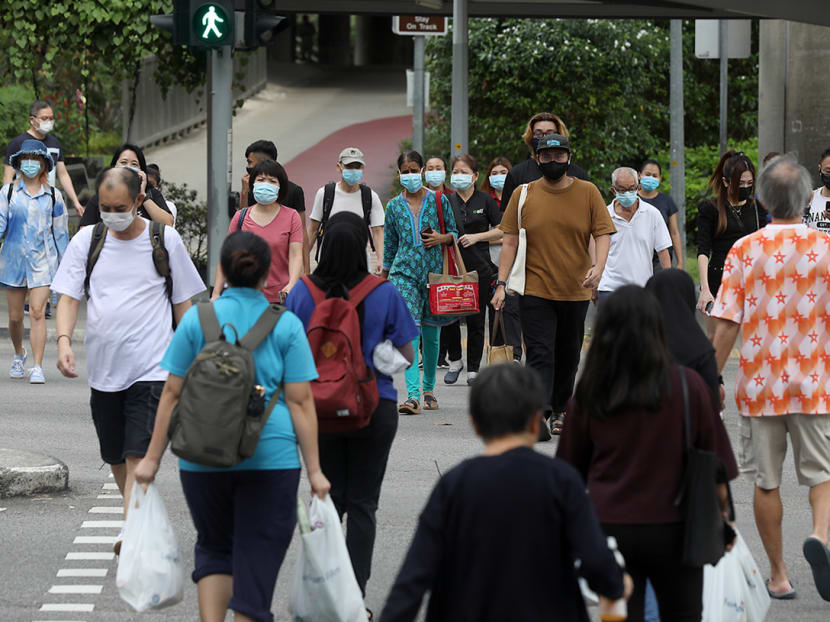NDR 2021: Chinese Singaporeans should be more aware of minorities’ challenges but Chinese privilege claim ‘entirely baseless’, says PM Lee
SINGAPORE — Chinese Singaporeans should try to better understand the concerns and difficulties faced by ethnic minorities, but it is “entirely baseless” to claim that Chinese privilege exists in Singapore, Prime Minister Lee Hsien Loong said on Sunday (Aug 29) in his Mandarin speech at the National Day Rally.

Chinese Singaporeans should try to better understand the concerns and difficulties faced by ethnic minorities, Prime Minister Lee Hsien Loong said.
- Some Chinese Singaporeans are unaware of the challenges that minorities face, Prime Minister Lee Hsien Loong said
- He cited the example of job ads seeking Mandarin speakers even when the roles do not require proficiency in the language
- He also cited the example of Chinese Singaporeans who decline to lease property to minorities
- He warned that if left unaddressed, these preferences will gradually deepen the fissures in society
- Still, he said it is baseless to claim that Chinese privilege exists here as the law treats everyone equally
SINGAPORE — Chinese Singaporeans should try to better understand the concerns and difficulties faced by ethnic minorities, but it is “entirely baseless” to claim that Chinese privilege exists in Singapore, Prime Minister Lee Hsien Loong said on Sunday (Aug 29) in his Mandarin speech at the National Day Rally.
Stressing that everyone is treated equally here and no group is accorded special privileges, he acknowledged, though, that the country's decades of peace have led people to “gradually take racial harmony for granted” — to the extent that some Chinese Singaporeans are unaware of the feelings and experiences of minorities.
In particular, he cited the examples of how minorities sometimes face difficulties when looking for a job or home to rent.
Some Chinese homeowners tell property agents upfront that they prefer not to have tenants of a particular race, which leads agents to reject any prospective non-Chinese tenants.
“Not all homeowners are like that, but it’s not difficult for us to imagine how hurt these minority tenants feel when they have such encounters,” he added.
On the job front, he noted that some jobs require proficiency in the Chinese language, and this is understandable and acceptable.
However, it is not a must for some other jobs, and if employers still want Mandarin-speakers as a requirement, the minorities will find this unreasonable and unfair.
He noted that it is “human nature” for people to be drawn to those with similar linguistic and cultural backgrounds when they seek friends and life partners, which concern people’s private lives and personal decisions with no great impact on society.
“But that is not the case when employing someone or renting a house,” he added.
“If we let the preferences of such employers and homeowners build up over time, they will become prejudiced, and minorities will feel they are discriminated against.”
He then warned: “If left unaddressed, such preferences will gradually deepen the fissures in our society. Therefore, all of us must uphold the principle of racial equality to build a more inclusive society.”
Mr Lee’s call during the National Day Rally came after Finance Minister Lawrence Wong spoke out against racism in June. Mr Wong had urged Singaporeans to be conscious of the needs of minorities, and to recognise that it is harder to be a minority than a majority in a multi-racial society.
.embed-container { position: relative; padding-bottom: 56.25%; height: 0; overflow: hidden; max-width: 100%; } .embed-container iframe, .embed-container object, .embed-container embed { position: absolute; top: 0; left: 0; width: 100%; height: 100%; }CHINESE COMMUNITY MADE COMPROMISE
Nevertheless, Mr Lee noted that Chinese Singaporeans have made some concessions for the greater good.
For instance, to put the ethnic minorities more at ease, Singapore adopted English as its lingua franca, and as a result, those who spoke only Mandarin and dialects were placed in a disadvantageous position, he said.
“Therefore, it is entirely baseless to claim that there is ‘Chinese privilege’ in Singapore,” he added. “We treat all races equally, with no special privileges. Few countries have made this their policy, and even fewer have managed to make it a reality.”
Half a century ago, the Chinese community made a compromise, and some among them even felt that they made a huge concession, Mr Lee said.
“But what we see after 56 years is testament that this fundamental national policy has benefitted all races, including the Chinese. It brought about racial harmony and social stability, which has enabled us to live peacefully. It has also helped to strengthen our relations with our neighbouring countries, and built trust.”
It is on the premise of “seeking unity amid diversity” that the Government wants to promote and preserve the rich cultural heritage of all races, he said.
He applauded efforts by clan associations and cultural institutions to keep Chinese culture alive, urging parents and grandparents to speak Mandarin with their children and grandchildren at home and expose them to their culture from young.
He also noted that Special Assistance Plan (SAP) schools, which were first established in 1979 to preserve the traditions and values of the former Chinese-medium schools that they replaced, allowed students to immerse themselves in a bilingual environment.
“SAP schools should also let their students interact more frequently with members of other races. That way, they will understand the importance of safeguarding our multicultural society from young. We must continue to prioritise this,” Mr Lee said.
Earlier on in his Malay speech, Mr Lee stressed that the nation has to carefully maintain the racial and religious harmony it has enjoyed since independence, through give-and-take and mutual respect and accommodation from all communities.
“The Government must make sure that any change to the rules would bring the different communities closer together and not divide us,” he said in Malay.











